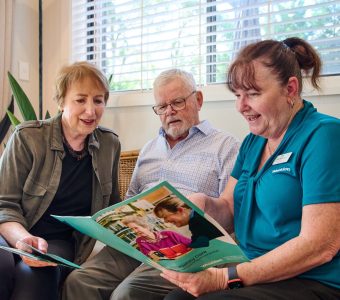
When Is It Time for Palliative or End-of-Life Care? A Guide for Families
Caring for someone as their health changes often brings questions. You might be unsure what kind of care is needed, or whether it’s time to consider more specialised support, like in-home nursing and clinical services. For many families, palliative or end-of-life care can feel like a big, fearful step, but it’s one that can bring reassurance, comfort and connection.
At Whiddon, we understand the emotions this stage can bring. This guide offers gentle support on what signs to look for, what to expect, and how we can walk alongside you and your loved one.
Signs That Someone May Be Entering a Palliative Phase
Palliative care isn’t just for the final days of life. It’s a holistic approach to care that begins earlier, supporting people with a life-limiting illness to live as well and as comfortably as possible.
Some signs that palliative or end-of-life care may be helpful include:
- Ongoing health decline, despite treatment
- Frequent hospital admissions or emergency visits
- Increasing pain, fatigue, or confusion
- Noticeable weight loss or reduced appetite
- Reduced mobility or greater reliance on others for daily tasks
- Withdrawing from usual interests, conversations or social contact
If you’re noticing any of these changes in your loved one, it may be time to consider whether additional support is needed. This support can benefit both the person receiving care and the people around them.
Why Earlier Support Can Make a Big Difference
Introducing palliative care earlier can bring peace of mind. It also opens the door to valuable support. When care is focused on compassion and quality of life, there is more room for meaningful moments, conversations and connection.
Early support also allows for:
- Better symptom management, including pain and nausea
- Support for emotional and spiritual wellbeing
- Time to explore choices and preferences, including Advance Care Planning
- Fewer unplanned hospital visits, reducing stress for everyone involved
- Stronger support for families, including guidance and resources
At Whiddon, we know that talking about end-of-life care doesn’t mean giving up. It means making sure the care your loved one receives reflects their needs, wishes and values.
What to Expect When Palliative or End-of-Life Care Begins
Our palliative care approach at Whiddon is based on dignity, compassion and individualised care. It’s not just about managing symptoms. It’s also about supporting the person as a whole and walking alongside their family.
When a person begins receiving palliative or end-of-life care at Whiddon, they can expect:
- A team-based approach, including nurses, carers, allied health professionals, GPs and spiritual care advisors
- Support with physical symptoms like pain, breathlessness, fatigue and discomfort
- Emotional and psychological support for both the persona and their family
- Cultural and spiritual care that respects beliefs, traditions and preferences
- Open and honest communication around care decisions, prognosis and planning
- A calm, safe and connected environment, whether at home or in residential aged care.
We also use tools like the Palliative Aged Care Outcomes Program (PACOP) and Advance Care Planning to guide decisions and honour each person’s goals.
When You’re Not Sure, Reach Out
You don’t need to wait for a doctor to bring it up. If you’re wondering whether palliative care might be right for your loved one, our team is here to talk with you about what’s happening and how we can help.
Even if it’s not time for end-of-life care just yet, we can help you prepare, ask the right questions and feel more confident in what’s ahead. Sometimes, the greatest comfort is simply knowing you are not alone.
How Whiddon Supports You
Our approach to palliative and end-of-life care is grounded in compassion, clinical expertise and deep respect for each individual and their family. Through resources like our End-of-Life Booklet, 24/7 nursing care, and our Excellence in Palliative Care framework, we provide both practical support and emotional reassurance.
Whether your loved one is living at home or in one of our care homes, we work closely with you to make sure their final chapter is filled with comfort, connection and dignity.
Get in touch with our friendly team today if you’d like to learn more about the next steps.




